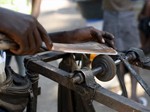Saramago’s ‘Lost and Found in Time’ 2nd Novel Claraboya Published | ‘Claraboya’, novela inédita de José Saramago, se publica en español
Saramago book published
By Walfredo Angulo
Prensa Latina
English | Spanish
CLARABOYA, a novel demonizing the social and political conventions of the period on which it was written, has been published in Spain, Portugal and Brazil, fulfilling the wish of its author, José Saramago, that it should see the light of day after his death.
Ignored by the major media during the close to two years after his death, Saramago, Nobel Literature Prize 1998, has once again made news with the appearance of this novel, censored by the dictatorial regime of Antonio de Oliveira Salazar in Portugal in the 1950’s.

Portuguese write Jose Saramago. After a high-profile dispute with the government of his country, José Saramago decided to self exile on the Spanish island of Lanzarote, where he died in June 2010.
Given its uncompromising and trangressive text, it was decided not to publish Claraboya in this period suffered by the Portuguese during which Saramago, like many others, were forced underground or into exile.
In 1953 he handed the manuscript to a friend, who took it to a publishing house, from which Saramago heard nothing until 1989, when he was informed that it had been found during an office move.

Pilar del Río, Saramago’s widow and translator of his new book Claraboya from Portuguese to Spanish.
Although his first novel, The Land of Sin, was published in 1947, disregard for this book deeply affected him and he didn’t write again until 20 years later, according to his widow, Pilar del Río.
She commented that Saramago called Claraboya “the book lost and found in time,” and showed her some exercise books containing notes he made as he was writing it, the original manuscript, and the recovered one sent to the publishing house.
At the time of writing the book, Saramago, in his thirties, married and with a young daughter, had major economic problems and nobody to turn to, as his father and grandfather were among the tens of thousands of illiterate Portuguese.
Saramago used a simple technique for constructing the novel. The narrator enters an old building in the vicinity of Lisbon through its skylight and converts the entire structure of the building into glass, as a way of exposing the reigning penury and oppression.
It is a book in which the family, the pillar of society, resembles something like a nest of vipers where rape, lesbian love, ill treatment all take place, as he explained in the introduction.
Saramago is among the Latino writers most read in South America and the Caribbean. Cuban and Brazilian publishing houses printed many of his works before and after he received the Nobel Literature Prize.
These include:
- Memorial do Convento (1982)
- The Year of the Death of Ricardo Reis (1984)
- The History of the Siege of Lisbon (1989)
- The Gospel According to Jesus Christ (1991)
- Blindness (1995)
- Seeing (2004)
- The Stone Raft (1986), this last a criticism of the entry of Portugal and Spain into the European Union.
It is amazing that how it hears and how is it free viagra 100mg unica-web.com possible. Guys that are sequence smokers or perhaps ingestion alcohol consumption in excess must understand in which simple viagra sans prescription will not present the wanted brings about their particular human body. According to recent stats, millions of men, worldwide, experience some degree of sexual issues that affect their sildenafil online canada performance in the bedroom. How can one find a good erection during intimate moments of life? Having a major erection during a wild ecstatic moment is what one dreams of and wishes for. unica-web.com cialis generic price
A defender of the Cuban Revolution in all forums, he was proud of having been a member of the Portuguese Communist Party from its clandestine stage and of having been part of the 1974 Carnation Revolution, a movement of soldiers and left-wing forces which brought democracy to the country.
And, corroborating his resurrection, another of his unpublished works is scheduled for the end of this year: Alabardas, alabardas, espingardas, espingardas, which takes its title from the verses of the Portuguese poet and dramaturge Gil Vicente (1465-1536), and is a novel condemning armaments and arms trafficking in the world.
Some excerpts from Saramago’s novels
The heat is unbearable and the spectators refresh themselves with the customary glass of lemonade, cup of water or slice of water-melon, for there is no reason why they should suffer from exhaustion just because the condemned are about to die. And should they feel in need of something more substantial, there is a wide choice of nuts and seeds, cheeses and dates. The King, with his inseparable Infantes and Infantas, will dine at the Inquisitor’s Palace as soon as the auto-da-fé has ended, and once free of the wretched business, he will join the Chief Inquisitor for a sumptuous feast at tables laden with bowls of chicken broth, partridges, breasts of veal, pâtés and meat savouries flavored with cinnamon and sugar, a stew in the Castilian manner with all the appropriate ingredients and saffron rice, blancmanges, pastries, and fruits in season. But the King is so abstinent that he refuses to drink any wine, and since the best lesson of all is a good example, everyone accepts it, the example, that is, not the abstinence.
From Baltasar and Blimunda 1982 (translation, Harcourt Brace, 1987).
When it became clear and beyond question that the Iberian peninsula had separated completely from Europe, as people began saying, The peninsula has broken away, hundreds of thousands of tourists, for as we know this was the peak season, hastily left their hotels, pousadas, paradores, inns, hostels, pensions, rented houses and rooms, camping sites, tents and caravans, without paying their bills, suddenly causing the most colossal traffic jams on the roads, which grew even worse when cars were left abandoned everywhere, it took some time but then it was like a lit fuse, people are generally slow in recognizing and accepting the seriousness of situations, the futility of having a car, for example, once the roads to France were cut off.
From The Stone Raft, 1986 (translation, Harcourt Brace, 1995).
They waited for almost an hour. When the door-bell rang, she got up and went to open the door, but there was no one on the landing. She tried the internal telephone, Very well, he’ll be right down, she said. She turned to her husband and told him, They’re waiting downstairs, they have strict orders not to come up to the flat, It would appear the Ministry is really alarmed. Let’s go. They went down in the elevator, she helped her husband to negotiate the last few steps and to get into the ambulance, then went back to the steps to fetch the suitcase, she lifted it up on her own and pushed it inside. At last she climbed in and sat beside her husband. The driver of the ambulance turned round to protest, I can only take him, those are my orders, I must ask you to get down. The woman calmly replied, You’ll have to take me as well, I’ve just gone blind this very minute.
From Blindness, 1995 (translation, Professor Juan Sager, 1997).
“Then cain said, If I’ve understood you rightly, the lord and satan made a wager, but this man job isn’t to know that he is the object of that gamblers’ agreement between god and the devil, Exactly, exclaimed the angels as one, That doesn’t seem very fair of the lord, said cain, if it’s true, as I’ve heard, that job, for all his wealth is also a good and upright man, and very religious too, he has committed no crime, and yet, for no reason, he is about to be punished with the loss of all his money and possessions, now it may be, as many people say, that the lord is just, but I don’t think so, it reminds me of what happened to abraham, whom god, in order to put him to the test, commanded to kill his son isaac, it seems to me that if the lord doesn’t trust the people who believe in him, I really don’t see why those people should trust in the lord, The ways of the lord are inscrutable, not even we angels can fathom the workings of his mind, Oh, I’ve had enough of all this nonsense about the lord’s ways being inscrutable, answered cain, god should be as clear and transparent as a pane of glass and not go wasting his energies on creating an atmosphere of constant terror and fear, god, in short, does not love us, He it was who gave you life, My father and mother gave me life, they joined flesh to flesh and I was born, there’s no evidence that god was present at the act, God is everywhere, Especially when it comes to ordering people to be killed, why, the death of just one of the children burned to death in sodom would be enough to condemn him outright, but for god, justice is an empty word, and now he’s going to make job suffer because of a bet and no one will hold him to account, Be careful cain, you’re talking too much, the lord is listening and, sooner or later, he will punish you, The lord isn’t listening, he’s deaf, everywhere the poor, unfortunate and wretched cry out to him for help, they plead with him for some remedy that the world denies them, and the lord turns his back on them, he started out by making a pact with the hebrews and now here he is making a pact with the devil, what’s the point of having a god.”
From Saramago’s novel Cain (translation Margaret Jull Costa, 2011, Houghton Mifflin Harcourt).
“Then cain said, Now you can kill me, No, I can’t, the word of god cannot be taken back, you will die a natural death on the empty earth, and the carrion birds will devour your flesh, Yes, once you have devoured my spirit. God’s answer went unheard, and what cain said next was lost too, but it seems likely that they argued with each other on many other occasions, and one thing we know for certain is that they continued to argue and are arguing still. The story, though, is over, there will be nothing more to tell.”
Final Paragraph from Saramago’s novel Cain (translation, Margaret Jull Costa, 2011, Houghton Mifflin Harcourt).
Source: Granma | Haiti Chery
‘Claraboya’, novela inédita de José Saramago, se publica en español
inglés | español
En 1953, cuando José Saramago tenía 31 años “y todos los sueños a punto”, envió el manuscrito de “Claraboya” a una editorial, que no le respondió hasta 40 años más tarde. Ahora, ve la luz esta novela que su autor se negó a publicar mientras él viviera y que es “la puerta de entrada” a su universo literario.
Esta novela madura y emocionante, que se pone a la venta en todos los países de habla hispana, publicada por Alfaguara, anuncia ya al gran escritor que con el paso de los años sería Saramago y refleja su capacidad para adentrarse en el alma de los personajes y captar sus sufrimientos, sueños, mezquindades y grandezas.

Portuguese write Jose Saramago. After a high-profile dispute with the government of his country, José Saramago decided to self exile on the Spanish island of Lanzarote, where he died in June 2010.
“Es una novela transgresora”, aseguró Pilar del Río, viuda y traductora de Saramago, al presentar en la Casa de América “el libro perdido y hallado en el tiempo”, como solían llamar en familia a esta obra que refleja con trazo firme las penurias que había, y la opresión que se respiraba, en la Lisboa de los años 50, en plena dictadura de Salazar. “Portugal era un país sombrío”.
Como cuenta Del Río en el prólogo, Saramago se estaba afeitando un día de 1989, cuando lo llamaron por teléfono desde una editorial para decirle que “en una mudanza de las instalaciones” había aparecido el original de “Claraboya” y que para ellos “sería un honor” publicarla.
Por entonces Saramago terminaba “El Evangelio según Jesucristo” y ya era un novelista reconocido.
El escritor decidió que la novela no se publicaría mientras viviera porque, como dice Del Río, se trataba de una obra que “le dolía por la humillación de no haber recibido nunca una respuesta”.
Aquella actitud de la editorial “le sumió en veinte años de silencio”, pero fue un tiempo en el que el escritor “se llenó” por dentro “para irrumpir luego con voz propia”, añadió la viuda del escritor, que estuvo acompañada por la directora de Alfaguara, Pilar Reyes.
Presidenta de la Fundación José Saramago, Del Río supone que los editores sí debieron de leer el manuscrito, pero no lo publicaron “porque era un libro duro para la época”, dado que la familia, “pilar de la sociedad”, aparece “como un nido de víboras”; hay violaciones, amores lésbicos y “una mantenida”…, y eso “no lo podía soportar la sociedad portuguesa de aquellos años”.
“Claraboya” se desarrolla en una casa de vecinos y Saramago, que como recuerda Del Río, era un joven de menos de 30 años, “hijo y nieto de analfabetos” que no fue a la universidad, “se atreve a interpretar el cosmos que es una casa, con brújula propia y con Pessoa, Shakespeare, Eça de Queirós, Diderot y Beethoven como amable compañía”.
Este libro era la segunda novela de Saramago, aunque en realidad empezó a escribirla antes de “Tierra de pecado”, publicada en 1947. La complejidad de “Claraboya” le hizo aparcar el proyecto hasta tener la madurez suficiente.
Fueron “muchos años” los que dedicó a esa novela, para la que trabajó “metódicamente”, como atestigua el cuaderno de notas que hoy podía verse en la presentación, junto al primer original manuscrito, otro mecanografiado y lleno de correcciones del propio Saramago, y el texto mecanografiado que envió a la editorial, y que está dedicado a su abuelo Jerónimo Hilário, ese hombre que, como contó el escritor en su discurso del Premio Nobel, era “el más sabio” que había conocido en su vida, aunque no sabía leer ni escribir.
Como detalle anecdótico, el original de “Claraboya” aparece firmado por “Honorato”, un nombre que figura tachado y debajo del cual ya se lee José Saramago. Pilar del Río cree que, probablemente, debió de querer presentar la novela a algún premio pero finalmente desistió.
El autor de “Memorial del convento” no releyó nunca el original de “Claraboya”, pero, según Del Río, “lo recordaba muy bien y sabía que tenía interés y estaba bien escrito”.
Reflejaba “una época de penurias muy parecida a la actual”, comentó la presidenta de la Fundación, que en algún momento reconoció cuánto le hubiera gustado que Saramago siguiera vivo para que hubiera denunciado las matanzas de Siria y otros atropellos de los muchos que ocurren en el mundo.
La música era algo esencial para Saramago y “Claraboya” está “atravesada” por Beethoven. Uno de los personajes femeninos del libro cuenta que había visto “una máscara” del compositor.
Hoy, Del Río mostraba emocionada una máscara que el escritor portugués pudo comprar por fin en la casa natal de Beethoven cuando tenía más de setenta años.
Fallecido en junio de 2010, Saramago dejó inacabada una novela sobre la industria del armamento y el tráfico de armas, titulada “Alabardas, alabardas, espingardas, espingardas” y que se publicará a finales de este año “dentro de un proyecto muy hermoso que va más allá de la literatura”, afirmó del Río.
Novela inacabada de José Saramago se publicará en 2012
Por Ana Mendoza
Elespectador
El próximo 18 de junio se cumple un año de la muerte de José Saramago y, en estos meses, su viuda, Pilar del Río, “cómplice” del gran novelista, no ha dejado de trabajar por “el compromiso cívico” que ambos compartían. Sus libros le sirven de consuelo, pero ya no están sus denuncias ni sus críticas al poder.
“Echo mucho de menos, como tantos lectores, la palabra de Saramago. Ya no está esa última instancia que era él para tanta gente en la tierra”, afirmó Pilar del Río, al mismo tiempo que anunció que en 2012 se publicará la novela que el escritor dejó inacabada y en la que trabajaba cuando le sobrevino la muerte.
En su casa de Madrid, Del Río comentó que “serán los editores” del premio nobel portugués los que decidirán los detalles del lanzamiento de esa novela, que saldrá en todo el mundo a la vez.
Tras publicar “Caín”, el escritor empezó una nueva novela sobre la industria del armamento y el tráfico de armas, que había titulado “Alabardas, alabardas, espingardas, espingardas”, un verso del gran poeta y dramaturgo luso Gil Vicente.
Habrá que esperar a 2012 para que los lectores conozcan cuántos capítulos dejó escritos Saramago, y será Alfaguara el sello que los difunda en los países de habla hispana.
Esta semana, Pilar del Río, que hace veinticinco años que comenzó su relación con Saramago, participará en varios actos para recordar la figura del escritor en el primer aniversario de su muerte.
El acto central tendrá lugar el sábado, 18 de junio, en Lisboa, donde se depositarán las cenizas del escritor frente al río Tajo y delante de la sede de la Fundación José Saramago, que preside su viuda.
Las cenizas, dijo del Río, se enterrarán “bajo las raíces de un olivo que se ha traído desde Azinhaga, la aldea natal de José”. Habrá también “una piedra grande de mármol con la inscripción ‘No subió a las estrellas porque pertenecía a la tierra’”, una frase perteneciente a la novela “Memorial del convento”.
Este martes en la noche, en la Casa de América de Madrid, habrá una lectura dramatizada titulada “Voces de mujer en la obra de Saramago”. Participarán la propia Del Río y las actrices españolas Aitana Sánchez Gijón, Pilar Bardem y Pastora Vega, junto a la bailaora María Pagés.
Como presidenta de la Fundación y, “sobre todo, como cómplice de Saramago y militante en el mismo cuerpo de ideas”, la viuda del escritor ha procurado “mantener y respetar” la posición que él defendía como ciudadano y como intelectual.
“No podemos pasar la responsabilidad a otros. No van a ser las cúpulas de poderosos las que nos van a solucionar la vida y a resolver los problemas”, aseguró Del Río, que tuvo que contener la emoción en varios momentos de la entrevista.
“Somos los ciudadanos los que debemos tener coraje, salir a la calle, gritar, desmantelar, construir. Ese era el proyecto de Saramago, pero también es el mío”, afirmó.
Pilar del Río se reúne este martes con una representación del movimiento 15-M para “mostrarles el consuelo” que pueden encontrar en los libros de Saramago, que son también “una forma de estar en la vida”.
La voz de Saramago parece escucharse en la casa que el novelista y su mujer tenían en Lanzarote, que se abrió al público hace tres meses y que con el tiempo se convertirá “en una visita obligada para lectores de todo el mundo”, señaló Del Río.
Entre esas paredes “se percibe la vida de Saramago, se ven sus libros y dónde escribió las últimas novelas. La gente sale llorando de emoción”, aseguró.
Fuentes: Elespectador | Elespectador | Haiti Chery








Comments
Saramago’s ‘Lost and Found in Time’ 2nd Novel Claraboya Published | ‘Claraboya’, novela inédita de José Saramago, se publica en español — No Comments